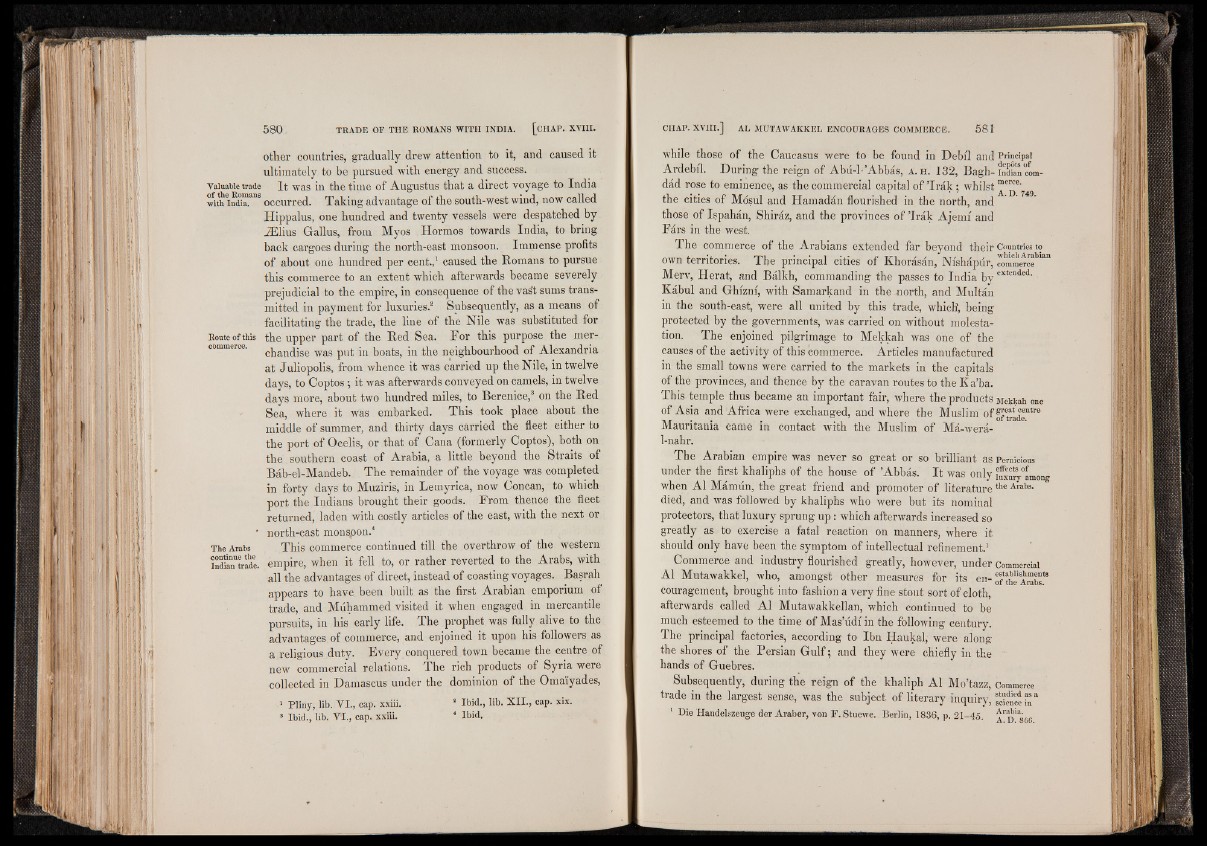
other countries, gradually drew attention to it, and caused it
ultimately to be pursued with energy and success.
Valuable trade It was in the time of Augustus that a direct voyage to India
Ìia indl™anS occurred. Taking advantage of the south-west wind, now called
Hippalus, one hundred and twenty vessels were despatched by
JElius Gallus, from Myos Hormos towards India, to bring
back cargoes during the north-east monsoon. Immense profits
of about one hundred per cent.,1 caused the Romans to pursue
this commerce to an extent which afterwards became severely
prejudicial to thè empire, in consequence of the vas't sums transmitted
in payment for luxuries.2 Subsequently, as a means of
facilitating the trade, the line of the Nile was substituted for
Route O f this the upper part of the Red Sea. For this purpose the mer-
commerce. cpantpse was pUt in boats, in the neighbourhood of Alexandria
at Juliopolis, from whence it was carried up the Nile, in twelve
days, to Coptos ; it was afterwards conveyed on camels, in twelve
days more, about two hundred miles, to Berenice,3 on the Red
Sea, where it was embarked. This took place about the
middle of summer, and thirty days carried the fleet either to
the port of Ocelis, or that of Cana (formerly Coptos), both on
the southern coast of Arabia, a little beyond the Straits of
Bab-el-Mandeb. The remainder of the voyage was completed
in forty days to Muziris, in Lemyrica, now Concan, to which
port the Indians brought their goods. From thence the fleet
returned, laden with costly articles of the east, with the next or
’ north-east mon^pon.4
The Arabs This commerce continued till the overthrow of the western
indìaiTtrade. empire, when it fell to, or rather reverted to the Arabs, with
all the advantages of direct, instead of coasting voyages. Basrah
appears to have been built as the first Arabian emporium of
trade, and Muhammed visited it when engaged in mercantile
pursuits, in his early life. The prophet was fully alive to the
advantages of commerce, and enjoined it upon his followers as
a religious duty. Every conquered town became the centre of
new commercial relations. The rich products of Syria were
collected in Damascus under the dominion of the Omai'yades,
1 Pliny, lib. V I., cap. xxiii. 2 Ibid., lib. X I I ., cap. xix.
3 Ibid., lib. V I., cap. xxiii. 4 Ibid,
while those of the Caucasus were to be found in Debil and Principal
Ardebil. During the reign of Abu-l-’Abbas, a . h . 132, Bagb- in d k n com-
dad rose to eminence, as the commercial capital of ’Irak; whilstraerce'
the cities of Mosul and Hamadan flourished in the north, and
those of Ispahan, Shiraz, and the provinces of ’Irak Ajemi and
Fars in the west.
The commerce of the Arabians extended far beyond their Countries to
own territories. The principal cities of Khorasan, Nishapur, rommereeblan
Merv, Herat, and Balkb, commanding the passes to India byextended'
Kabul and Ghizni, with Samarkand in the -aorth, and Multan
in the south-east, were all united by this trade, which, being
protected by the governments, was carried on without molestation.
The enjoined pilgrimage to Mekkah was one of the
causes of the activity of this commerce. Articles manufactured
in the small towns were carried to the markets in the capitals
of the provinces, and thence by the caravan routes to theKa’ba.
This temple thus became an important fair, where the products Mekkah one
of Asia and Africa were exchanged, and where the Muslim of ®£ct^™trc
Mauritania came in contact with the Muslim of Ma-wera-
1-nahr.
The Arabian empire was never so great or so brilliant as Pernicious
under the first khaliphs of the house of ’Abbas. It was only SS^Long
when A1 Mamun, the great friend and promoter of literaturethe Arabs-
died, and was followed by khaliphs who were but its nominal
protectors, that luxury sprung up: which afterwards increased so
greatly as to exercise a fatal reaction on manners, where it
should only have been the symptom of intellectual refinement.1
Commerce and industry flourished greatly, however, under Commercial
A1 Mutawakkel, who, amongst other measures for its en-rftieArTbf
couragement, brought into fashion a very fine stout sort of cloth,
afterwards called A1 Mutawakkellan, which continued to be
much esteemed to the time of Mas’udi in the following century.
The principal factories, according to Ibn Haukal, were along
the shores of the Persian Gulf; and they were chiefly in the
hands of Guebres.
Subsequently, during the reign of the khaliph A1 Mo’tazz, Commerce
trade in the largest sense, was the subject of literary inquiry, science ?na
1 Die Handelszeuge der A raber, von F . Stuewe. Berlin, 1836, p. 21-45. Arabia. ^ * * ' A> L/. 866.